Major Richard "Dick" Winters led his men in the 101st Airborne Division through the Normandy Invasion and the Battle of the Bulge before being immortalized in "Band of Brothers."
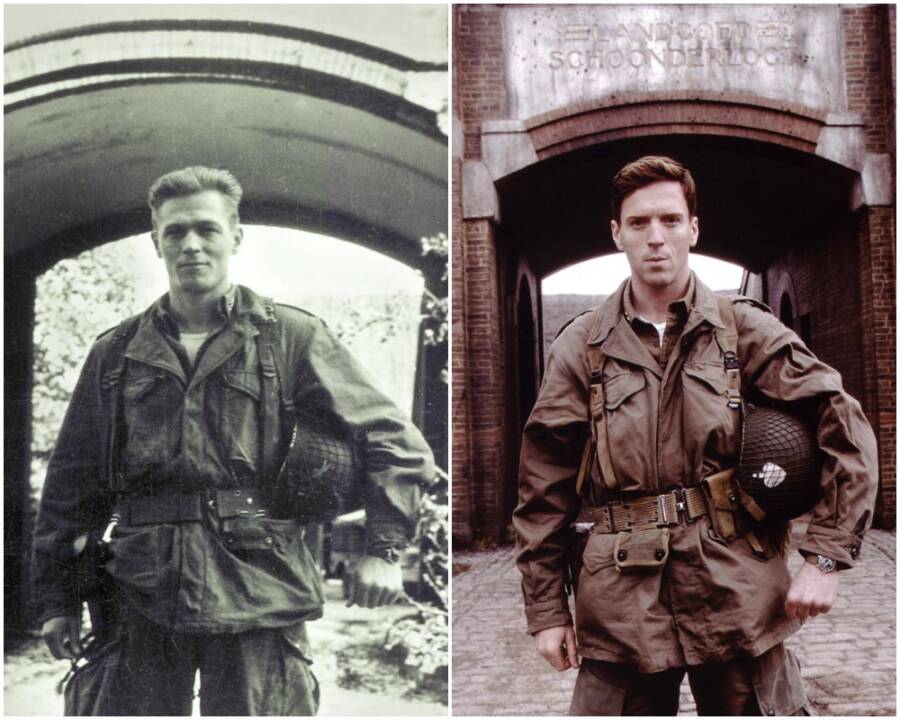
U.S. Army/HBORichard Winters (left) and Damian Lewis portraying him (right) in Band of Brothers.
Decades after he fought in World War II, U.S. Army Major Richard Winters had a poignant exchange with his grandson, one that exemplified his quiet selflessness.
“One day, my grandson said to me, ‘Grandpa, were you a hero in the war? And I said to him, ‘No, I’m not a hero, but I have served in a company full of them.”
Though he never bragged about it, Major Dick Winters led perhaps the most storied U.S. Army unit in all of World War II.
On D-Day, he and his “band of brothers” in Easy Company defeated a far larger German force and allowed the Allied advance to continue. At the Dachau concentration camp, they liberated scores of Holocaust prisoners who’d endured months, if not years, of hell.
And as the war in Europe drew to a close, they captured Hitler’s personal mountaintop retreat in southern Germany — then kicked back on his terrace in triumph while sipping champagne from his wine cellar.
But for decades, Winters was reluctant to even tell his story, lest he be called a hero. Eventually, however, Easy Company’s harrowing and courageous exploits on the Western front in 1944 and 1945 would be immortalized in the 2001 HBO series Band of Brothers.
This is the full story of Richard Winters and Easy Company that the acclaimed series only hinted at.
Dick Winters Prepares For War
Born on January 21, 1918, in New Holland, Pennsylvania, Richard Winters was eager to make something of himself. He worked odd jobs as a teen in order to afford Franklin & Marshall College, where he earned a bachelor’s in economics in August 1941.
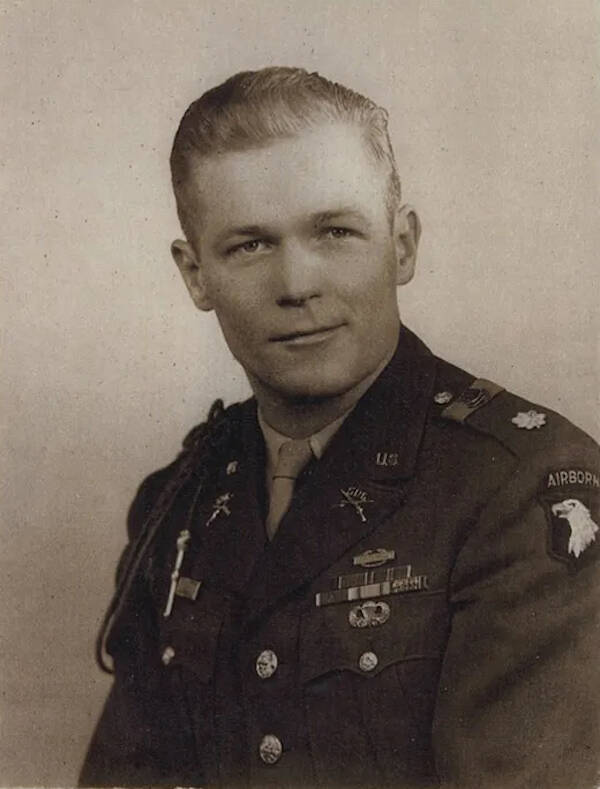
United States ArmyRichard Winters enlisted at 23 years old.
With the government having instituted a draft, Winters enlisted to avoid a full three-year tour by completing one year voluntarily. After departing for basic training at Camp Croft, South Carolina, in September, however, he found himself rising rapidly in the ranks.
Placed in Army Officer Cadet School and assigned to the 101st Airborne Division in April 1942, Winters was promoted to Second Lieutenant. He volunteered for paratrooper training and was assigned to Company E, 2nd Battalion (or Easy Company) of the 506th Parachute Infantry Regiment at Camp Toccoa, Georgia under the command of Herbert Sobel.
Some of the first U.S. soldiers to receive airborne training were in Easy Company. Winters excelled and was promoted to First Lieutenant in October. Within a year, he and his men would be deployed to England — to prepare for the invasion of Normandy.
How Dick Winters Took Charge Of Easy Company
Just after dropping into Normandy around 1 a.m. on June 6, 1944, Winters located his men. They informed him that German artillery had shot down the entire headquarters of Easy Company, including their commanding officer. As first lieutenant with Allied forces hours away from landing on Utah Beach, Winters took charge.
“It started on D-Day under machine-gun fire,” he recalled. “When I saw others next to me get hit just because they lifted their head up at the wrong time, I knew I could be killed, too. I said, ‘My dear God, if I live through this, all I want is peace and quiet.'”
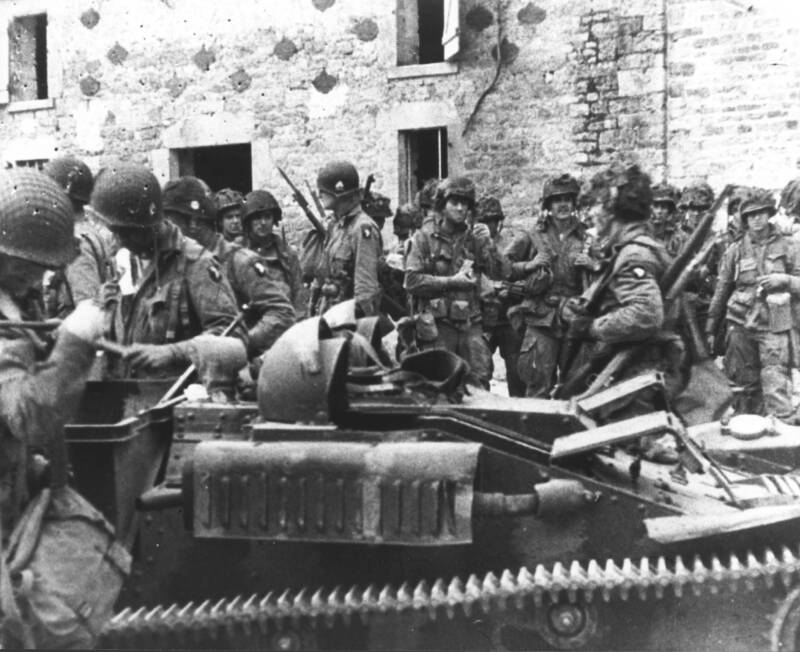
Wikimedia CommonsThe 101st Airborne, after making it to St. Marcouf near Utah Beach.
As night turned to day, Winters directed his 13 men to assault 50 Nazis firing artillery at primary exits along Utah Beach. Known as the Brécourt Manor Assault, the attack would later be taught at West Point for decades. Winters’ retrieval of a map detailing German positions along the coast, meanwhile, saw Winters promoted to captain.
Easy Company would later parachute into Son, Holland, in September. As part of Operation Market Garden, Winters directed an assault against 200 Nazi soldiers with only 20 men. Three months later, they arrived in Bastogne, Belgium — for the Battle of the Bulge.
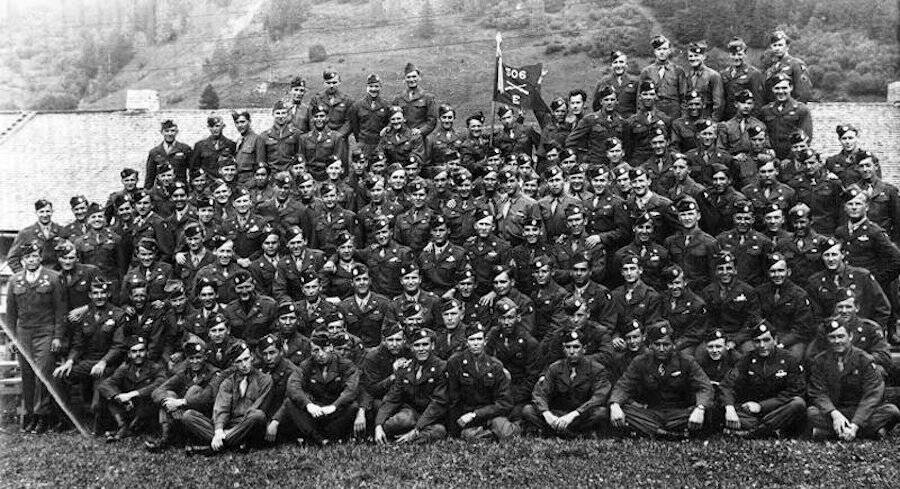
Wikimedia CommonsEasy Company in Austria following the war.
The Nazis had launched a desperate counter-offensive on December 16, 1944, with the 101st Airborne under fire from about 15 German divisions for nearly a week. Facing death, Winters held Allied ground until General Patton’s Third Army arrived.
Major Winters And His Band Of Brothers
Winters was promoted eight days after Adolf Hitler’s suicide on April 30, 1945, and tasked with capturing the dictator’s alpine retreat, Berchtesgaden. His men concluded their trek on May 5, with Nazi Germany capitulating two days later. Winters remained in Europe during Allied demobilization, personally accepting the surrender of German soldiers.
Band of Brothers depicted Winters respectfully declining the Luger of a surrendering German colonel in this operation. In reality, that pistol was a Walther PP and the colonel a major — and Winters did accept the gun.
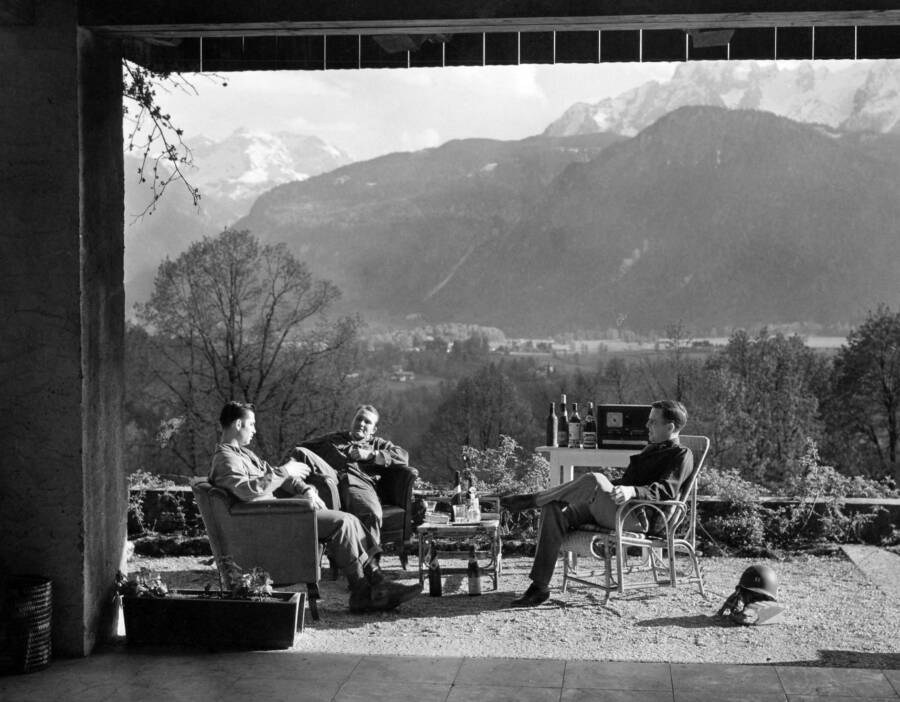
Photo12/Universal Images Group/Getty ImagesMajor Dick Winters (left) and members of Easy Company in Austria in 1945.
Ultimately, Dick Winters set sail for America from Marseille, France, on November 4, 1945. He would later be ordered to redeploy to the Korean War in 1951, just after marrying — but Winters refused and resigned after trying his hand as a planning and training officer.
Decades later, the retiree demanded a meeting with historian Stephen Ambrose, when he learned Ambrose was writing a book on Easy Company. Winters had been reluctant for many years to tell his story for fear of being depicted as a hero — but he wanted to make sure that Ambrose got it right. Their talk in February 1990 helped ensure the book’s accuracy.
The book would later be adapted in the 2001 HBO series Band of Brothers. The award-winning series and Damian Lewis’ performance further cemented Major Richard Winters in the national imagination. His reputation as a hero now more widely known than ever, Winters died at 92 on January 2, 2011, and he was memorialized with a statue that stands to this day at Utah Beach, France.
After learning about Dick Winters, read about other Band of Brothers heroes like Lewis Nixon and Ronald Speirs.





